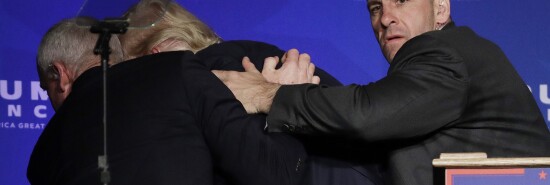
Trump’s New York travel poses special Secret Service challenges
Tom Rogan
The arrival of Donald Trump in Manhattan on Monday, followed by his arraignment in a city court on Tuesday, poses special challenges for the U.S. Secret Service.
The primary challenge centers on the highly publicized nature of Trump’s visit. Both opponents and supporters of the former president know that he will be at Trump Tower and then at the Manhattan courthouse. Trump is an undeniably divisive figure, evoking both emotive support and hostility. The NYPD and Secret Service will thus anticipate supporting and opposing protesters in the city. But while the Secret Service must guard against a would-be Trump assailant using any protest crowd for concealment, the NYPD and FBI must guard against any assailant who may wish to target those seen as Trump’s enemies. A key concern is that prospective assailants are attracted to high visibility, high media attention events. Few better examples are offered in that regard by Trump’s arraignment.
This protective effort will entail significant resources. Agents from the Secret Service’s Dignitary Protective Division and New York Field Office will be drafted in to secure “posts” or locations around Trump. One advantage here is that many New York-based agents are recently and highly experienced with protective missions, being as they are often tasked with protecting foreign leaders as they visit the United Nations.
CHINA REMINDS EUROPE THAT OBEDIENCE IS THE COST OF PROFIT
NYPD officers will secure the crowd. Secret Service counter-sniper and counter-assault teams will be present. Disrupting New York’s already chaotic traffic, motorcade routes will very likely be secured, as would be the case were Biden in town.
Still, the challenge of protecting a former rather than current president is that some resources are not available for former presidents. As with the State Department’s Diplomatic Security Service, the Secret Service already carries a very heavy protective workload. But Trump does not have access to the Marine Corps’ One helicopter squadron, for example. And because Trump’s personal helicopter lacks the defensive capabilities of the presidential helicopter fleet, the Secret Service will likely limit itself to moving him by motorcade.
The Secret Service’s primary concern over the coming days will be to limit Trump’s visibility to the public and thus also to potential assailants. But the stress factor on this trip will be unusually high.
